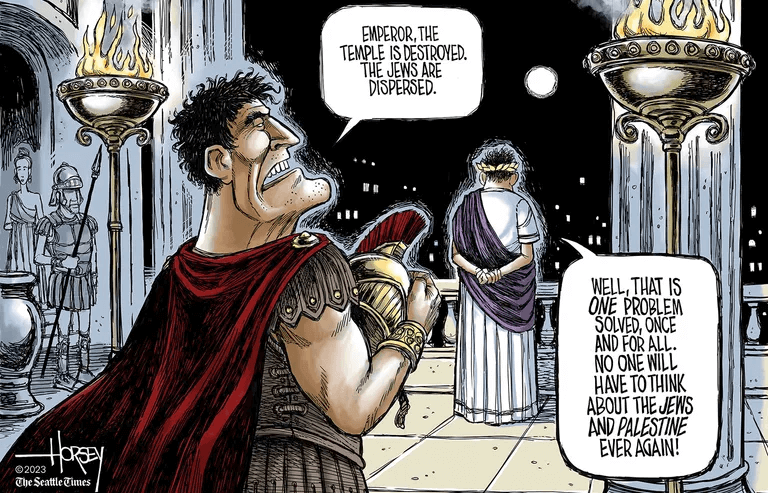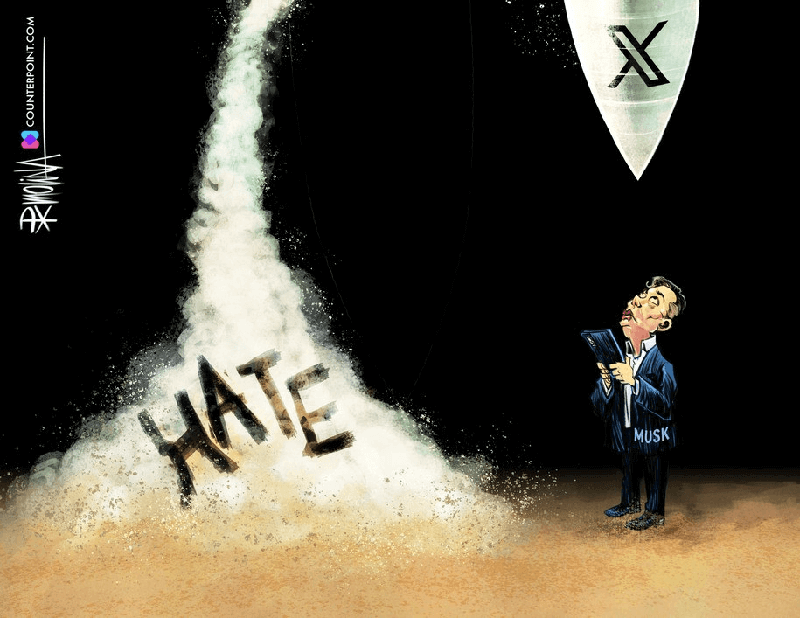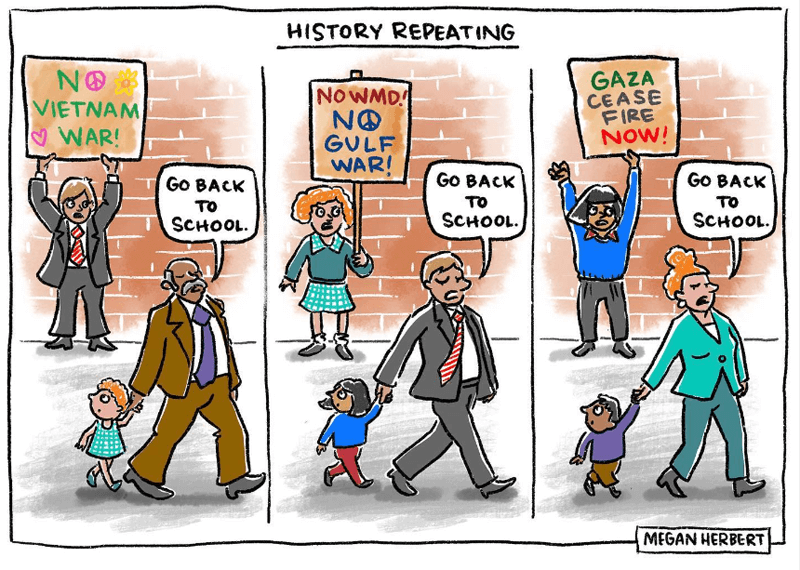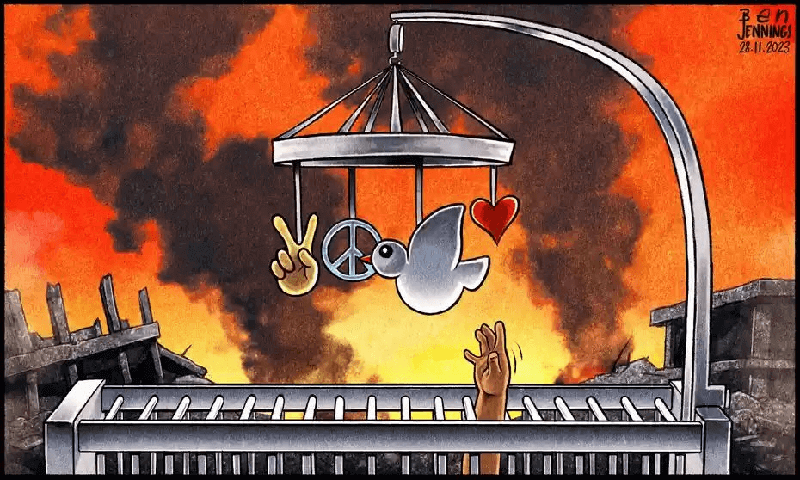CSotD: Waiting for their dreams to die
Skip to comments
Ah, if only it were as simple as this!
David Horsey is being sarcastic, because, of course, the destruction of the temple and the dispersal of Jews from the Holy Lands didn’t end the crisis of the Diaspora.
The problem is that, while that event was cataclysmic, it was not definitive. That is, it’s a crucial milestone, but it was not an isolated moment and, like many other population groups, the Jews had not been sitting still all those centuries, and their comings and goings form a complex history of both voluntary and involuntary movement.
It ain’t over yet, and it isn’t likely to ever be.

Martyn Turner apparently would like the Irish government to take a firmer stance on the current problems in the Holy Land, but his collection of indefinite placards is a good tally of how outsiders find themselves having to address matters. For instance, I’m using the term “Holy Land” to avoid saying “Palestine” or “Israel” or “Gaza” or “West Bank,” each of which carries a certain amount of weight.
It reminds me of when I was in Ireland, standing on a hilltop looking north across the border into Northern Ireland. I was used to the term “British Isles” but recognized that it was not appropriate and asked my cousin how they described the two main islands.
“We call that one Britain and this one Ireland,” he said with a shrug. It made perfect sense, but you could hardly call it non-political, because it didn’t explain how Britain had maintained a foothold on the island that was not Britain.
The Holy Land is holy to all the People of the Book, but if you think that’s a unifying principle, you have certainly not been paying attention. And if you think you can talk about the region without political implications, you’re either a liar or a lunatic.
Speaking of whom …
Juxtaposition of the Day

Pedro X. Molina — Counterpoint

It’s hard to tell whether Elon Musk is a liar or a lunatic, but that may be a fool’s errand, since he may turn out to be both.
His racist and antisemitic outbursts, followed by his visit to Israel this week, seem like the situation where someone gets drunk and blurts out a racist insult, then apologizes the next morning. The only realistic response is, “I know you’re sorry you said it, but all the liquor did was let your feelings escape.”
So he goes off to Israel and makes nice-nice with Bibi and then comes back home and promptly endorses Pizzagate.
It would be laughable if he were not inspiring crazed, gullible, armed screwballs and using an influential social platform to advance his appetite for dictators, foreign and domestic.
With his faithful sidekick, Linda Yaccarino, trailing behind him, watching major advertisers wise up and run away, while she puts out cheery promotional messages about how well everything is going.


Fiona Katauskas looks at Musk, at Trump, at Geert Wilders, at Mateusz Morawiecki, not to mention Putin and Xi and the US Freedom Caucus, and concludes that they are furnishing inspiration for a whole generation of button-down rightwing power freaks, perhaps this one not named entirely at random.
The guidance counselor explains that turning out little monsters is not in her job description. Maybe that’s still true in Sydney, but there are a couple of states here where that guidance counselor would be getting some job counseling herself, and likely a toss to the curb, if she didn’t toe the line and advise kids properly.

Al Goodwyn (Creators) comes down against school administrators who don’t crack the whip and make kids express the correct political opinions and follow the acceptable lifestyles. As his cartoon suggests, the world is not a place for free expression and unusual behaviors, and, in his view, allowing young people to question the norms now will only make their lives difficult later.

It would be nice if people would visit the schools before they criticize, but it’s never been that way, and Owen Dunne explored a popular bit of hot air nearly a decade ago.

Things have, if anything, become worse, as the cranks organize into well-funded mobs to take over local school boards, while rich donors have become militant in demanding that colleges control the thoughts of their students and faculty along acceptable Ingsoc lines.
Okay, yes, that picture is from a long time ago and they were saying the Pledge, but, as Stephen Walt writes in Foreign Policy, school is for learning, and universities, in particular, should both tolerate dissent and keep their institutional noses out of issues that are not distinctly relevant to their own operation.

Sage Stossel, whose cartoons are too large and detailed to fit into this format, contrasts the current issues on college campuses with her own experience a generation ago, and you should click here and go see the entire piece.
It reminded me of my son calling home during the First Gulf War because his dorm did not have cable and, as the first missiles rained down, the networks were not doing the job as well as CNN. I held the phone up to the TV while he and his friends listened in — and this was back when you paid by the minute for long distance calls.
But they cared that much, they wanted to know what was really going on and they knew the networks were not digging in.

First Dog on the Moon salutes young people who won’t shut up, salute and fall into line. Clearly, he knows where good behavior leads.
Back in the Vietnam days, we joked that our kids would rebel against us by getting haircuts, wearing suits and joining the Briefcase Bourgeoisie. It seemed very funny until Alex P. Keaton came along a few years later and made prophets of us all.

Megan Herbert reminds us that we’ve always had young dissenters, and we’ve always had parents who discouraged them, and, as the flow of her tryptic reveals, doing so only encourages the young ones to grow into their role as mayflies, stinging the horse into action.

However, as Ben Jennings warns, the trick is to live long enough to grow into that vital role.
Promises of peace are not the same as peace itself.


Comments 6
Comments are closed.